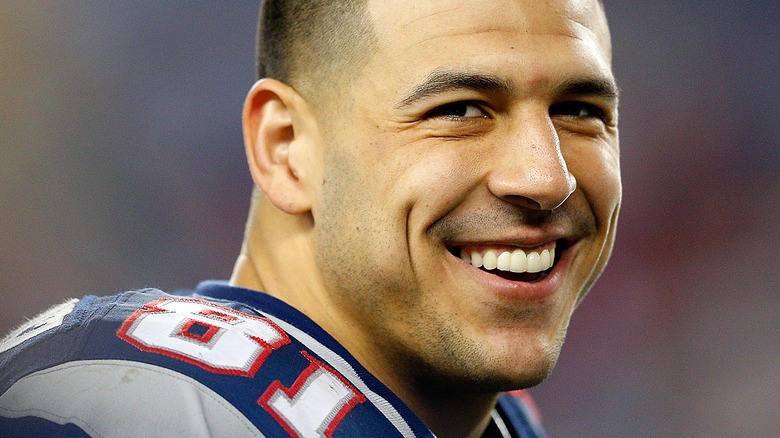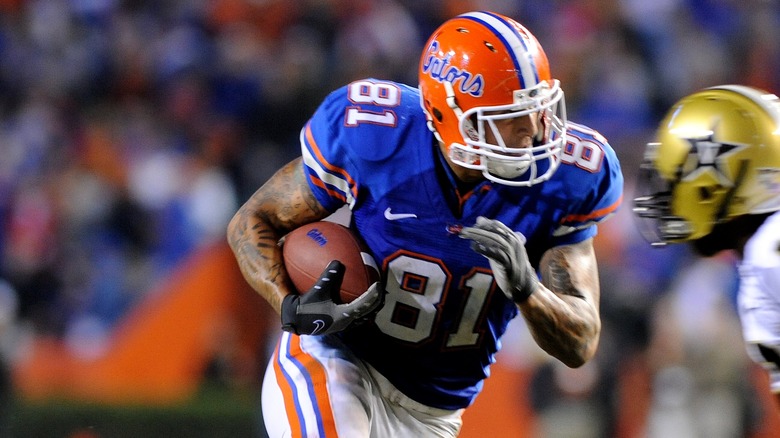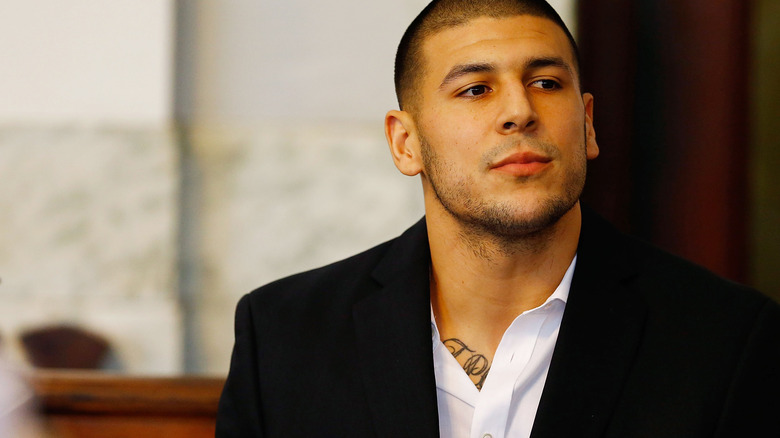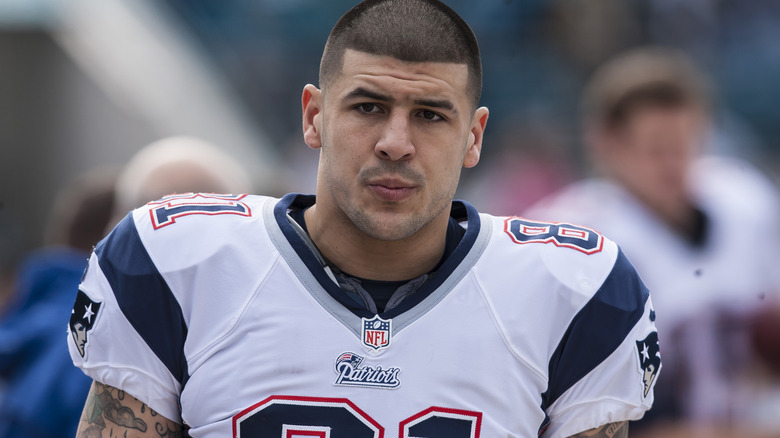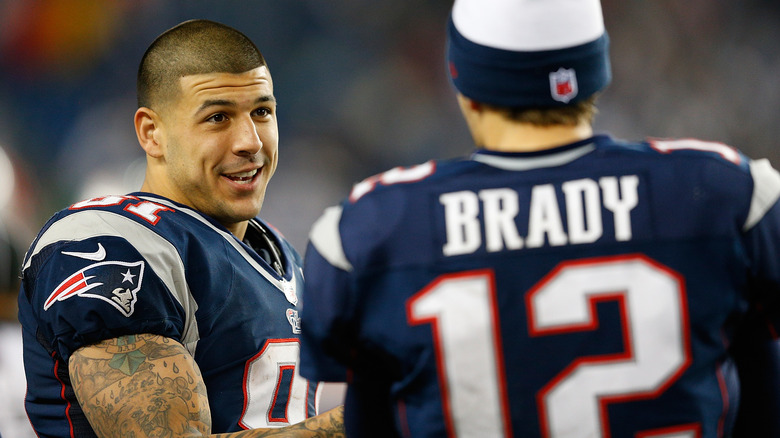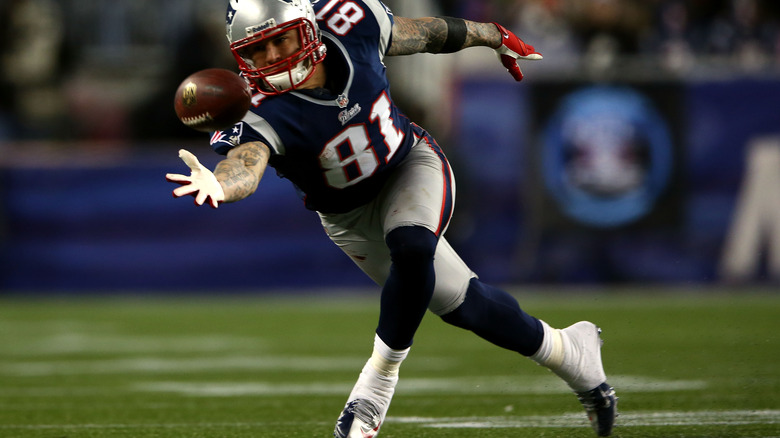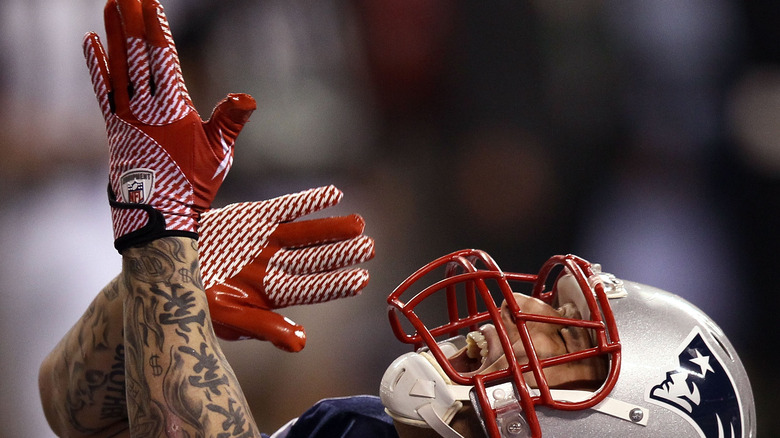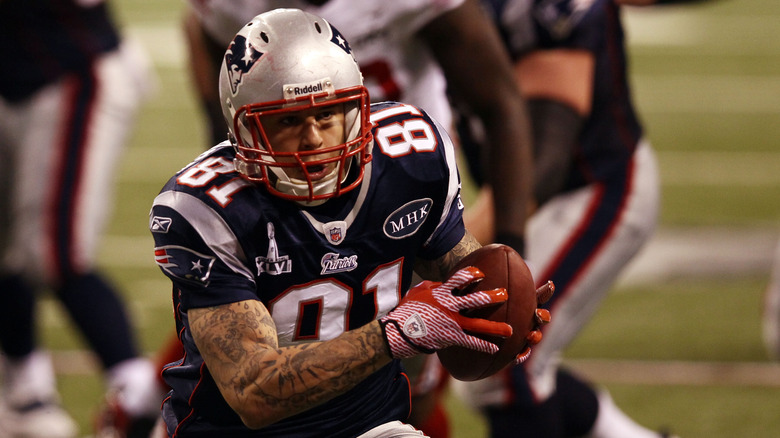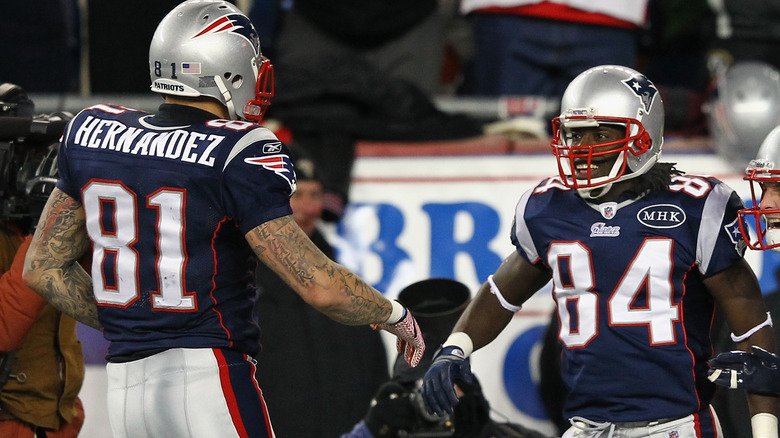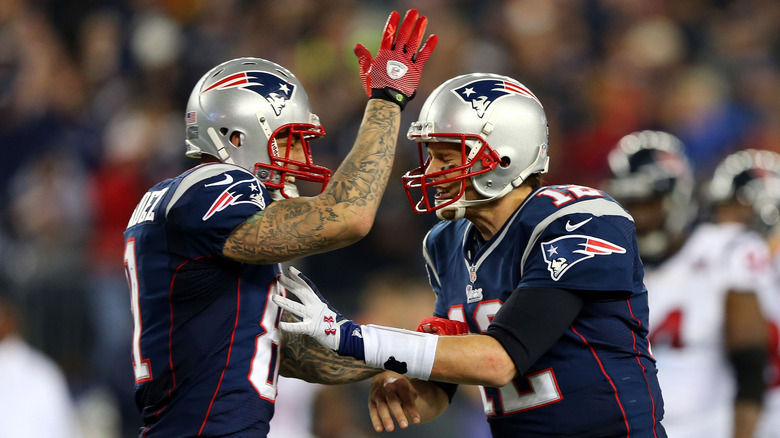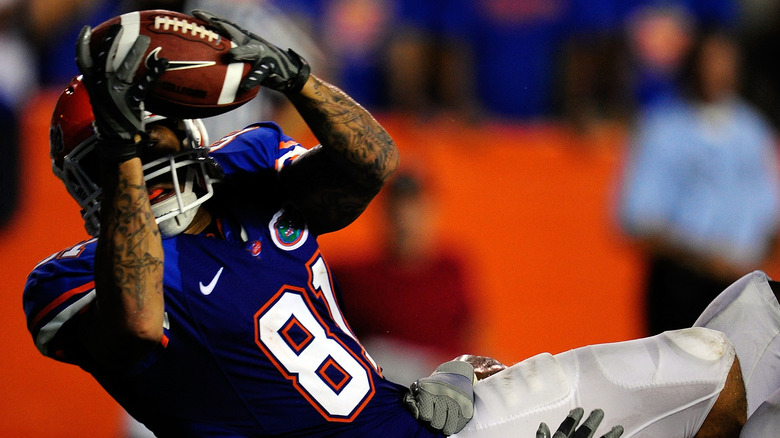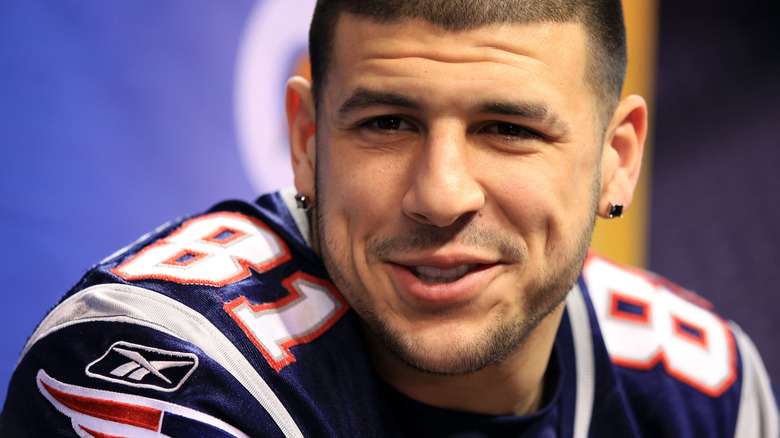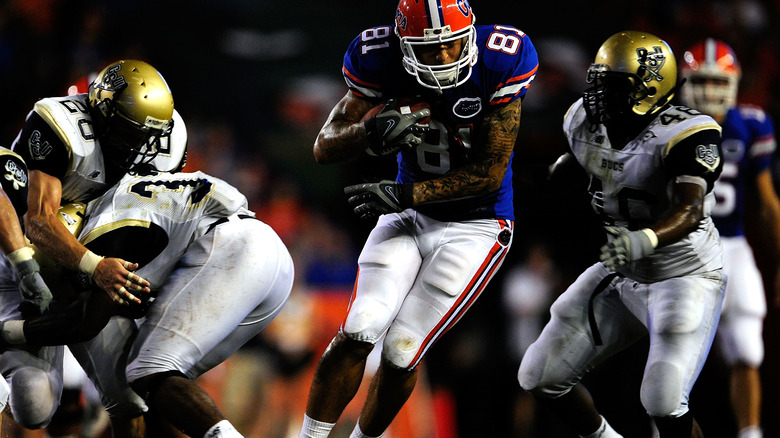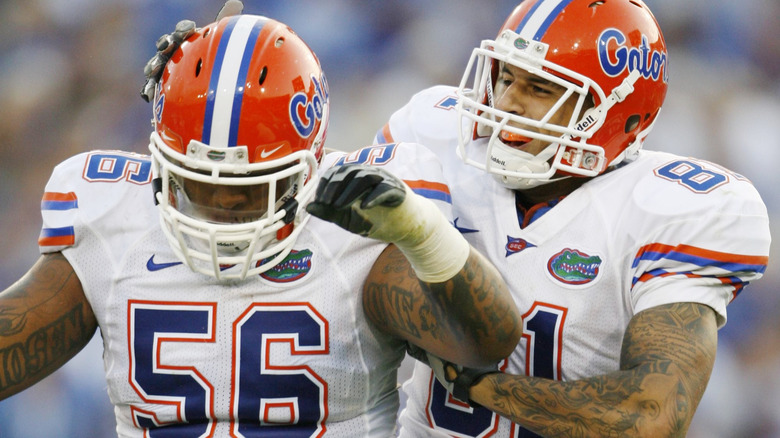What Aaron Hernandez's Former Teammates Said About Him
In 2010, Aaron Hernandez achieved what countless people only dream of: He was drafted by the New England Patriots. However, what unfolded over the following years was a series of very public tragedies, set against the background of a young rising star in the NFL. Daniel de Abreu and Safiro Furtado were shot and killed in 2012, just a month before Hernandez signed a contract for a whopping $40 million. Only months later, a lawsuit was filed alleging that Hernandez had shot another man in the face in Florida. Then, four months after that, the body of Odin Lloyd — who had been dating the sister of Hernandez's fiancée — was discovered, and about a year after being arrested in connection with Lloyd's death, Hernandez was indicted on charges connected to the murders of de Abreu and Furtado.
The Patriots dropped their young star after his arrest, but the nation was captivated by what unfolded. Hernandez was found guilty in Lloyd's murder case and acquitted in the other, but was still handed a mandatory life sentence.
The story, says CBS News, didn't end when Hernandez was taken to prison. On April 19, 2017 — just over two years since his sentencing — he died by suicide in his cell. Shortly after, The Washington Post reported that an autopsy revealed that he had been suffering from the advanced stages of traumatic brain injury likely caused by repeat hits in football. So, did his teammates see anything amiss? What did they have to say?
He was the life of the party
In 2018, The Boston Globe did a deep dive into Aaron Hernandez's story. They found a number of times that he was failed — by high school, by his college, by his coaches and teachers, and by the NFL — and it started with his acceptance into the University of Florida when he was just 17. His high school principal expressed a deep regret that he hadn't fought harder to keep him in high school longer, and his college teammates spoke of a teenager who was very, very different than the one who would go on trial for murder in just a few years.
Hernandez's nickname had been Chico, and one of the things teammates remembered about the B student was that he partied — a lot. But in the locker room? "He always tried to be the life of the party," recalled Ahmad Black, a former teammate. As soon as the team hit their stride, Black recalled that they all slipped into their comfort zone. A well-oiled machine on the field, off the field, they all knew how good they were. "We danced in the locker room for hours after practice. We weren't interested in going home."
Still, there were signs that Hernandez was struggling to adjust: Just before finals, he punched a bar manager so hard that he ruptured the man's eardrum. Hernandez wasn't arrested for what would have been a felony, and was given a verbal warning instead.
An immature but happy guy
An investigation from The Boston Globe found a common thread that ran through all those they spoke to about Aaron Hernandez: He was unpredictable. Sometimes, he was the nicest person on the planet. Other times? Not so much.
Reporters got transcripts of conversations with Brandon Beam, a friend and former teammate from Hernandez's days playing at Bristol Central. Beam was involved with Hernandez's first run-in with the police as a player for the Patriots, in an incident that came after law enforcement responded to reports of a fight. Beam later said that they should have been arrested earlier — he had been pulled over doing 120 in a 55 mph zone — but Hernandez had leveraged his position on the Patriots to get them out of it. That had led to the argument that attracted police again, and according to Beam, that wasn't the Hernandez he knew from high school.
Bean described him to Rolling Stone, painting the picture of someone who was emotionally much, much younger than his peers: "The guy would do anything to crack us up. Stuff his lunch in his mouth in a single bite, or take a booger that was hanging out and eat that s***."
A former high school teammate confirmed their relationship
Motives are ultimately something that's deeply personal, and according to NBC News, the Netflix documentary "Killer Inside: The Mind of Aaron Hernandez" tried to explain what had led him to go from rising star to convicted murderer. The documentary alleged that it was a perfect storm of struggles, including the pressure to perform, the effects of the degenerative brain disease he was diagnosed with after his death, and struggles with his sexuality.
According to one former teammate, Hernandez was gay — and spent his life feeling like he couldn't come out to anyone. Dennis SanSoucie was the quarterback at Bristol Central, and they set some school records for passing and completions. He later went on record with The Boston Globe to say that they weren't just friends, but that they got high together — a lot — and were in a sexual relationship that started when they were in seventh grade and continued into high school.
"Me and Aaron experimented. If I look at it now, yes, we were in a relationship back then," SanSoucie has said. He has also spoken about how Hernandez knew that his father absolutely would not accept him if he was gay, and continued in another interview: "Me and him were very much into trying to hide what we were doing. We didn't want people to know."
Attempts at mentoring
Not all comments made regarding Aaron Hernandez were made in public, or, were meant for public ears. When The Boston Globe sifted through all they could find about Hernandez, they discovered a 2011 conversation between his then-teammate, New England Patriots quarterback Tom Brady, and his University of Florida ex-teammate, Tim Tebow. The Pats were playing the Broncos in Denver, and the two had the chance to chat face-to-face briefly — and their conversation was caught by microphones.
Tebow, it seems, had attempted to take a few players under his wing while they were still in college — including Hernandez. He ultimately reached out to Brady for a little back-up, and in the exchange, Brady told him, "I'm trying to watch over Aaron and Brandon [Spikes, another Gator-turned-Patriot]."
Tebow reassured him: "I appreciate that, man. They're good guys." But, it seems, they hadn't taken many of his lessons with them. Brady replied: "Yeah, [but] a lot to handle."
A 'wow' moment
Drafted in 2010, Aaron Hernandez was arrested and released from his contract with the Patriots on June 26, 2013 (via CBS News). On the same day, Dallas's 105.3 The Fan spoke with Jesse Holley, a former Dallas Cowboy who happened to also be a former teammate of Hernandez. He said (via CBS), "It's just been a huge 'wow' situation — to know Aaron, to know what kind of person he is ... it's just a 'wow' situation."
Holley went on to say that Hernandez was the type that threw himself into the game completely and absolutely, and added that he didn't have many friends — on the team or outside of it — and that he didn't seem to have much in the way of family, either.
The following day, former Patriot Matt Light spoke with Tom Archdeacon from the Dayton Daily News (via CBS). He didn't pull any punches, either, and Archdeacon later said that it was the first time he'd ever heard Light say a bad word about anyone. Light — who had since retired from the Patriots after playing alongside Hernandez, commented, "I never talk about other guys, but I will say I have never embraced — never believed in — anything Aaron Hernandez stood for."
It took a confrontation to get respect
One of the many people The Boston Globe spoke to was Dane Fletcher, the Patriot linebacker who joined the team alongside Aaron Hernandez, and faced off against him when it was time to run drills. Trash-talking between the two only escalated, and it led to a locker room confrontation that could have turned brutal. It wouldn't have been the first time they'd exchanged punches, Fletcher recalled, but instead, Hernandez — on the heels of ridiculing him — said, "But here's the deal. I respect you."
The newly-discovered respect turned into the sort of relationship where Fletcher was introduced to Hernandez's other friends. That meant Fletcher knew how shady those friends were, could testify to seeing police question the group, and that he knew that Hernandez had an apartment that he referred to as his "side place." Fletcher elaborated, saying that was where the illicit stuff (such as drugs and weapons) was stored and went down.
After Hernandez was arrested and released by the Patriots, The Boston Globe says Bill Belichick headed up a press conference to address the matter. Saying, "I'm personally disappointed and hurt in a situation like this," he had more to say about it behind the scenes. It was Fletcher who explained they were simply told never to speak of him again.
Teammates recalled volatile locker room behavior
Brandon Lloyd was a receiver who worked on the offense alongside Aaron Hernandez, and when he spoke to The Boston Globe about what had gone on in the locker room, he talked about just how volatile, unpredictable, and potentially dangerous everyone had felt Hernandez was. Not only that, but he said that before he'd witnessed anything, another veteran — Wes Welker — had prepped him for what he was in for: "And he says, 'I just want to warn you that [Hernandez] is going to talk about being bathed by his mother. He's going to have his genitalia out in front of you while you're sitting on your stool. ... Just do your best to ignore it. Even walk away.'"
Lloyd went on to say that not even that talk could have prepared him for being in a locker room with Hernandez, who regularly went from seeking validation and advice to going off in a terrifying rage. He wasn't the only one to make comments along those lines, either.
An anonymous teammate echoed those sentiments in an interview with People, saying, "Everything about Aaron was a struggle. He had these really angry outbursts a lot, over insignificant things. And when he started, he couldn't stop."
One teammate had nothing but good things to say
Only days after Aaron Hernandez was both arrested and released by the Patriots, Deion Branch gave a statement that was picked up by The Albany Herald (via ESPN). He had nothing but good things to say about Hernandez: "Aaron is a great guy and a great friend of mine and a great teammate. I love him to death, and it was shocking to hear his name involved in this situation. I truly hope and pray he doesn't have any dealings with it."
Branch — who was a wide receiver for the Patriots when Hernandez started playing in 2010 — went on to stress that no matter who was responsible for Odin Lloyd's death, justice needed to be served: "Most of all, what we as Americans need to understand is that is somebody's child that was a victim."
But at the time, Branch was certain that Hernandez's name would be cleared. "That's my guy, man. That's my guy. It really shocked me. He was a great kid."
Tom Brady has moved on
Had things gone differently, Tom Brady and Aaron Hernandez might have been one of the great duos in the NFL. That, of course, didn't pan out, and just weeks after Hernandez's arrest, Brady was interviewed in Sports Illustrated. He was asked how losing Hernandez was going to change the game, and Brady was pretty straightforward: "My job is to play quarterback ... regardless of who is out there on the field with me. I have moved on. I'm focusing on the great teammates I have who are committed to helping us win games — nothing else."
Brady was being asked about Hernandez again in the months after his death and diagnosis with CTE, and by the time WEEI asked about him, five years had passed since they played together. Brady said that Hernandez didn't often cross his thoughts. "It's just very tragic, for everyone involved," he said. "To have a teammate who we were all in the huddle with, played some great games with ... it's just a horrible thing. I don't know what to make of it. It's just very, very sad."
And what about feelings in the other direction? TMZ got their hands on a letter that Hernandez sent in 2016, and while he condemned some — like owner Robert Kraft — he had nothing but praise for Brady, who, he wrote, "I love to death and always will and only hope the best for."
Here's what Tim Tebow said of the player he tried to mentor
Tim Tebow's relationship with Aaron Hernandez went a long way back — all the way to the multiple times Tebow interceded on his behalf at the University of Florida. According to what The Boston Globe discovered, that included going to coach Urban Meyer and convincing him not to throw the problem tight end off the team.
Meyer's recruitment practices would later come under some massive scrutiny after Hernandez's death and even before the bombshell that he had been diagnosed with a severely advanced case of CTE. Along with defending Meyer to ESPN on the heels of Hernandez's death, Tebow made a few comments about the teammate he had tried so hard to protect.
"It's just heartbreaking and sad, and all my thoughts and prayers go out to all the families that were involved," he said. And then, he cut that whole line of questioning short: "I understand why you have to ask all the questions; that's part of doing your job. Part of mine is listening to instruction, and we've been told not to talk about it."
Here's what Rob Gronkowski had to say when he opened up
Not long after Aaron Hernandez's death, Rob Gronkowski was one of a group that sat down for an interview with CBS. When he was asked about it, he simply said, "Next question," and when the reporter kept pushing the issue — even asking others in the room — Gronkowski stood up and walked off.
It took a long time for Gronkowski to make any kind of statement about Hernandez; it wasn't until 2021 when he was being interviewed on the "10 Questions with Kyle Brandt" podcast. This time, he gave a statement. "I get questions like that all the time, about him and everything. With everything going on, I was definitely shook when I heard that, when I heard everything about it."
He went on to say that no one had really looked that deeply into the fact that was what Hernandez might have been doing off the field, and that the entire saga had left him deeply upset.
An ex-teammate spoke to him the night before he died
When Aaron Hernandez was playing ball for the University of Florida, two of his teammates were also two of his best friends. That was Mike Pouncey and his twin brother, Maurkice (who went on to play for the Dolphins and the Steelers, respectively). The Pouncey brothers remained Hernandez's close friends throughout his trial and conviction, and Mike would later tell USA Today that he had spoken to Hernandez on the night before he died by suicide:
"He was in great spirits. He was excited ... Obviously, I don't condone any of the things that he was accused of, but just to have a friend I was so close with, that I felt like he was my brother and I know that he felt the same way, it's tough. It's tough for anyone to have a loss in their family, but that one right there hit me and my brother really hard."
The conversation came not long after Hernandez was acquitted of the murder charges that had followed the 2012 deaths, and Pouncey said that he was nothing but shocked by the news of Hernandez's death. He also posted on Instagram, calling Hernandez his friend and brother before adding, "Through thick and thin right or wrong we never left each other's side. Today my heart hurts as I got the worse news I could have imagined. ... we will meet again rest easy!"
If you or anyone you know is having suicidal thoughts, please call the National Suicide Prevention Lifeline by dialing 988 or by calling 1-800-273-TALK (8255).
Maurkice Pouncey's thoughts on the legitimacy of the documentary
TMZ caught up with Maurkice Pouncey around the release of Netflix's "Killer Inside: The Mind Of Aaron Hernandez," and asked him just what he thought about it. He didn't pull any punches, saying, "It's all b*******. Me and Mike Pouncey ain't on there ... doing the documentary, don't believe it."
They also asked him if there was any truth to the documentary claims that Hernandez had been struggling to come to terms with his sexuality, and Pouncey was quick to say that although he knew that wasn't the case, it wouldn't have changed how he and his brother felt about their ex-teammate and longtime friend.
In July 2013, Pouncey found himself needing to apologize for photos that started circulating after a night in a Miami nightclub. He and his brother, Mike, were photographed wearing hats that said, "Free Hernandez," and he later tweeted (via EPSN), "I fully recognize the seriousness of the situation involving my former teammate, and I regret that my actions appear to make light of that serious situation. I apologize to anyone who was offended by my actions."
